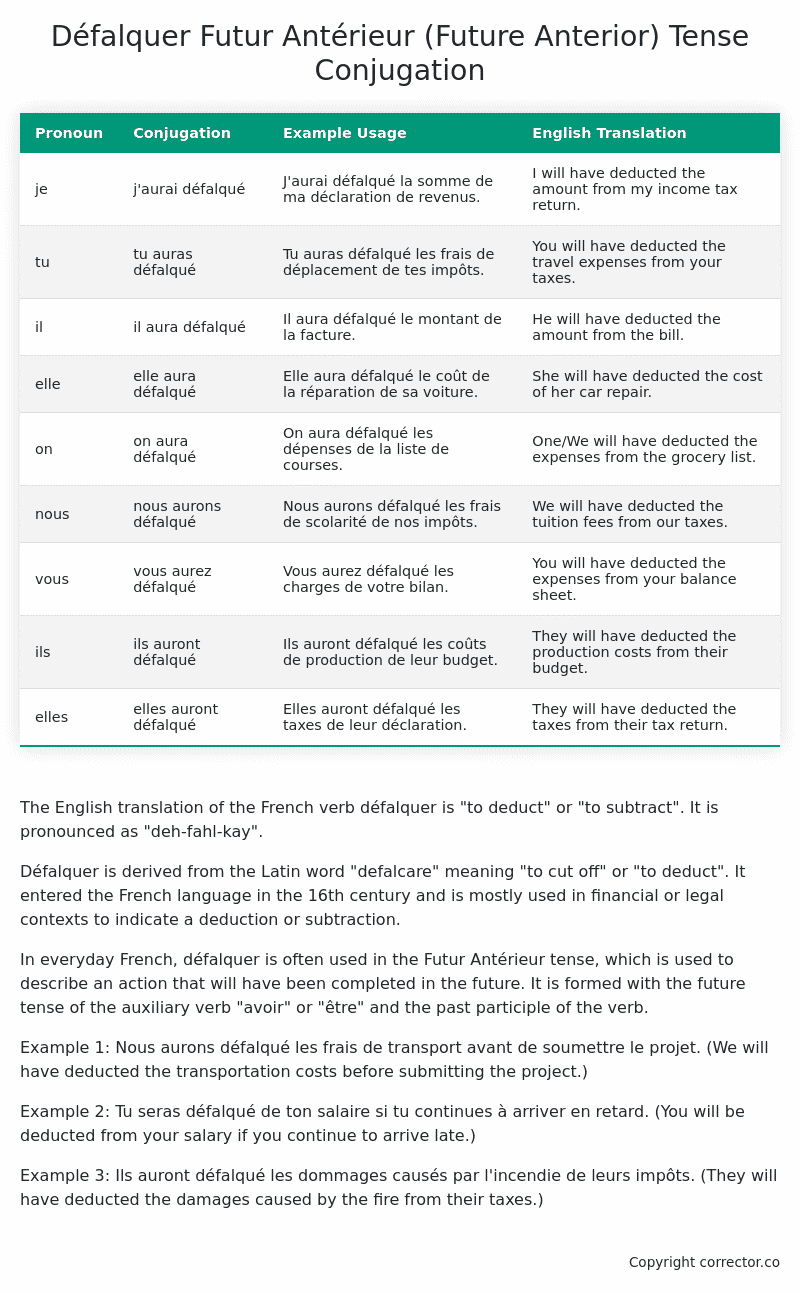Futur Antérieur (Future Anterior) Tense Conjugation of the French Verb défalquer
Introduction to the verb défalquer
The English translation of the French verb défalquer is “to deduct” or “to subtract”. It is pronounced as “deh-fahl-kay”.
Défalquer is derived from the Latin word “defalcare” meaning “to cut off” or “to deduct”. It entered the French language in the 16th century and is mostly used in financial or legal contexts to indicate a deduction or subtraction.
In everyday French, défalquer is often used in the Futur Antérieur tense, which is used to describe an action that will have been completed in the future. It is formed with the future tense of the auxiliary verb “avoir” or “être” and the past participle of the verb.
Example 1: Nous aurons défalqué les frais de transport avant de soumettre le projet. (We will have deducted the transportation costs before submitting the project.)
Example 2: Tu seras défalqué de ton salaire si tu continues à arriver en retard. (You will be deducted from your salary if you continue to arrive late.)
Example 3: Ils auront défalqué les dommages causés par l’incendie de leurs impôts. (They will have deducted the damages caused by the fire from their taxes.)
Table of the Futur Antérieur (Future Anterior) Tense Conjugation of défalquer
| Pronoun | Conjugation | Example Usage | English Translation |
|---|---|---|---|
| je | j’aurai défalqué | J’aurai défalqué la somme de ma déclaration de revenus. | I will have deducted the amount from my income tax return. |
| tu | tu auras défalqué | Tu auras défalqué les frais de déplacement de tes impôts. | You will have deducted the travel expenses from your taxes. |
| il | il aura défalqué | Il aura défalqué le montant de la facture. | He will have deducted the amount from the bill. |
| elle | elle aura défalqué | Elle aura défalqué le coût de la réparation de sa voiture. | She will have deducted the cost of her car repair. |
| on | on aura défalqué | On aura défalqué les dépenses de la liste de courses. | One/We will have deducted the expenses from the grocery list. |
| nous | nous aurons défalqué | Nous aurons défalqué les frais de scolarité de nos impôts. | We will have deducted the tuition fees from our taxes. |
| vous | vous aurez défalqué | Vous aurez défalqué les charges de votre bilan. | You will have deducted the expenses from your balance sheet. |
| ils | ils auront défalqué | Ils auront défalqué les coûts de production de leur budget. | They will have deducted the production costs from their budget. |
| elles | elles auront défalqué | Elles auront défalqué les taxes de leur déclaration. | They will have deducted the taxes from their tax return. |
Other Conjugations for Défalquer.
Le Present (Present Tense) Conjugation of the French Verb défalquer
Imparfait (Imperfect) Tense Conjugation of the French Verb défalquer
Passé Simple (Simple Past) Tense Conjugation of the French Verb défalquer
Passé Composé (Present Perfect) Tense Conjugation of the French Verb défalquer
Futur Simple (Simple Future) Tense Conjugation of the French Verb défalquer
Futur Proche (Near Future) Tense Conjugation of the French Verb défalquer
Plus-que-parfait (Pluperfect) Tense Conjugation of the French Verb défalquer
Passé Antérieur (Past Anterior) Tense Conjugation of the French Verb défalquer
Futur Antérieur (Future Anterior) Tense Conjugation of the French Verb défalquer (this article)
Subjonctif Présent (Subjunctive Present) Tense Conjugation of the French Verb défalquer
Subjonctif Passé (Subjunctive Past) Tense Conjugation of the French Verb défalquer
Subjonctif Imparfait (Subjunctive Imperfect) Tense Conjugation of the French Verb défalquer
Subjonctif Plus-que-parfait (Subjunctive Pluperfect) Tense Conjugation of the French Verb défalquer
Conditionnel Présent (Conditional Present) Tense Conjugation of the French Verb défalquer
Conditionnel Passé (Conditional Past) Tense Conjugation of the French Verb défalquer
L’impératif Présent (Imperative Present) Tense Conjugation of the French Verb défalquer
L’infinitif Présent (Infinitive Present) Tense Conjugation of the French Verb défalquer
Struggling with French verbs or the language in general? Why not use our free French Grammar Checker – no registration required!
Get a FREE Download Study Sheet of this Conjugation 🔥
Simply right click the image below, click “save image” and get your free reference for the défalquer Futur Antérieur tense conjugation!

Défalquer – About the French Futur Antérieur (Future Anterior) Tense
Construction
Common Everyday Usage Patterns
Interactions with Other Tenses
For example
Summary
I hope you enjoyed this article on the verb défalquer. Still in a learning mood? Check out another TOTALLY random French verb conjugation!


